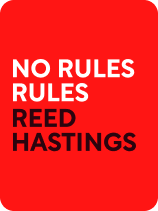

This article is an excerpt from the Shortform book guide to "No Rules Rules" by Reed Hastings. Shortform has the world's best summaries and analyses of books you should be reading.
Like this article? Sign up for a free trial here .
How do Netflix salaries compare with the salaries at competing companies? What role does the salary strategy at Netflix play in their success?
Netflix salaries do not use common structures like salary bands, raise pools or performance-based bonuses. The strategy used by Netflix is to pay top-of-the-market salaries so they are able to attract and keep the best talent.
Read on for more about Netflix salaries and the strategy shared by Reed Hastings in No Rules Rules.
Netflix Salaries: A Critical Part of the Corporate Strategy
The Netflix staff had already proven the value of having a high talent density—but Netflix employees were so talented that other companies threatened to poach them. Hastings realized he would have to pay top dollar to maintain the company’s high talent density.
Hastings was willing to invest in top talent because he knew what research had proven: A few high performers could achieve more than a large team of average workers. In a 1968 experiment, researchers set out to discover the discrepancy between high and low performers by asking a group of computer programmers to complete a set of tasks within two hours. They found that the programmer who performed best was 25 times faster at debugging and 10 times faster at coding than the lowest-performing—yet perfectly adequate—participant. Hastings considered how this “rock-star principle” could apply to non-programming positions, and he realized that the gap between rock stars and average workers depended on the type of job they performed:
- In operational jobs, such as drivers and window washers, rock stars offer about double the value of their average colleagues. Since the difference between the best worker and an adequate worker is fairly negligible, Hastings determined that he could offer average salaries for operational positions.
- In creative jobs, such as publicists and producers—which constitute the majority of positions at Netflix—rock-stars provide exponentially higher value than average employees. Rock stars are invaluable because they are innovative and adaptable: They can see opportunities and solutions that others can’t, and they have an ability to adjust their way of thinking to avoid getting stuck in one perspective. Accordingly, it’s worth the investment to hire one creative rock star at top dollar instead of hiring 10 to 25 average employees at average salaries.
Netflix salaries led to a lean, high-performing workforce, which increased the speed of innovation and output. Additionally, there were two major benefits for managers:
- It was easier to manage high-performing employees than to corral merely adequate employees.
- It was easier to manage a smaller workforce.
To make the strategy of Netflix salaries for a high talent density successful, the executive team had to determine how and how much to pay employees.
Eliminate Performance-Based Bonuses
While many big companies pay employees a salary and offer annual bonuses for reaching predetermined goals, Netflix rejected bonuses and instead put that money into larger base salaries. The move paid off, as Hastings discovered that job candidates prefer guaranteed money over the possibility of earning bonuses. Netflix salaries include guaranteed payment without a focus on bonuses for the remaining amount.
Although it seems that performance-based bonuses would incentivize workers to achieve more, the bonus system assumes that managers can accurately predict which achievements will be most valuable to the company in the year ahead—but those metrics are constantly subject to change. For example, in one quarter, Netflix’s marketing team focused on the rate at which it grew membership, but the following quarter, customer retention was a more important metric of success. Creating a bonus system doesn’t allow for the flexibility to chase evolving goals—rather, it incentivizes employees to pursue potentially irrelevant goals in order to earn their bonuses.
Additionally, high-performing employees like the ones that fill Netflix’s offices are internally motivated to work hard, and dangling a bonus in front of them doesn’t change that. In reality, the allure of the bonus makes employees constantly aware of whether they’re on track to reach their goals, and that concern actually crowds workers’ minds and inhibits their creativity. Research bears this out: A study offered three groups of participants high, medium, and low cash bonuses for completing tasks well. When the tasks required only mechanical skills—such as hitting a key as quickly as possible—the incentives worked, but when the tasks required any creativity or cognitive skill, people offered the highest bonuses performed worst. Most of the jobs at Netflix require creativity, so implementing bonuses made no sense.
Give Raises That Reflect Employees’ Market Value
In addition to bonuses, Netflix took an untraditional approach to raises by giving raises that keep employees’ salaries competitive with the rest of the market for their position. Netflix salaries prevent employees from being lured to other jobs purely for higher pay, which is a common threat. In fact, research shows that in 2018, the average annual pay raise for American workers was just 3 percent, but those who quit and started new jobs increased their salaries by an average of 10 to 20 percent.
A Netflix employee who’s performing well and whose skills are highly valuable may get a 20 percent raise one year to reflect the market—but the following year, if the market hasn’t changed, that same employee may still be doing excellent work and receive no raise. If an employee’s skill set continually increases, or if the market for those skills continues to rise, that employee may see steady raises year after year. On the other hand, if the market for another employee’s position remains stable, that employee may not get a raise for multiple years in a row, even if she is performing well. (The exception to Netflix’s follow-the-market policy is that if the market for a particular position drops, Netflix generally does not decrease that employee’s salary.)
By contrast, most companies use “raise pools” and “salary bands” to determine employee raises:
- A raise pool allots a certain amount of money to divide among employees’ raises—typically the pool is about 2-5 percent of employees’ cumulative salaries. Managers’ hands are tied if one employee asks for a higher raise, because it would reduce the money available for other employees’ raises.
- A salary band puts a cap on the total salary you can reach through raises. For example, if your salary band is $50,000 to $60,000, and you get 6 percent raises each of the first few years, your salary will increase to $53,000 after the first year, $56,180 the next year, and $59,550 the following year. After three years, you’ve nearly hit the limit on your salary band, and you are ineligible for raises that bring your salary above $60,000—regardless of how well you’re performing.
These outdated methods of giving raises are ill-suited for a job market in which the value of certain skills can change rapidly and people change jobs often.
Netflix Salaries Are Top-of-Market Pay
When it comes to how much to pay employees, the answer is simple: More than anyone else. Hastings knew that Netflix had to pay enough not just to attract the highest-performing employees, but also to prevent them from being poached. Since the rock-star principle and his focus on a high talent density left him with a lean staff, Hastings made it a priority to pay his employees more than any other company would offer them—even if it was more than the employee asked for.

———End of Preview———
Like what you just read? Read the rest of the world's best book summary and analysis of Reed Hastings's "No Rules Rules" at Shortform .
Here's what you'll find in our full No Rules Rules summary :
- How Netflix achieved massive success in a short period of time
- The unusual business practices that have helped Netflix sustain its success
- Why Netflix fires adequate employees






